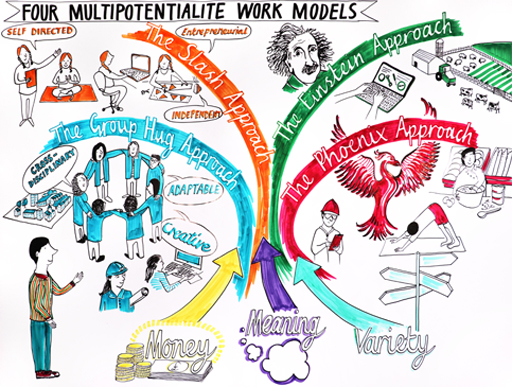9 What are my career options with a multidisciplinary qualification?
Not all students pursue a multidisciplinary qualification for career reasons; many choose this option as a way to build on personal interests and expand their knowledge in a range of different areas. However, multidisciplinary students that are studying for career reasons have the opportunity to pursue a wide range of careers, as a result of their varied personal and professional interests and the wide choice of subjects available to study.
If you are undecided about whether to study courses in science or arts subjects in a career context, it will depend very much on the type of role that you are interested in pursuing. For example, if you want to work in a science-based industry, you may find that employers are more familiar with the content and format of science-related qualifications. It is therefore important that you carry out your research as early as possible to ensure that you are taking the most appropriate subjects.
However, even if you are not currently studying for career reasons, it is important to realise that a multidisciplinary qualification does not limit your career choices in the future. Quite the opposite in fact, as it can prepare you for a range of different careers at any one time, or during your working life. Research reveals that around a third of employers surveyed have no preferred degree subject when recruiting graduates (CBI/Pearson, 2017). This means that multidisciplinary students have the opportunity to consider a wide variety of different careers and are able to choose an approach to work that specifically addresses their interests in a wide range of subject and career options.
Next, you will explore career coach Emilie Wapnick’s four work models. In order to appreciate how one or more of these might apply to you, you first need to understand the importance of money, meaning and variety to a multipotentialite, as they can be important factors to consider when thinking about potential careers.
According to Wapnick, some amount of money is necessary to live, whatever your beliefs or issues might be about it. Money can be seen as one ingredient to a happy life, however, on its own money isn’t enough. Money can help multitpotentialites to pursue their passions after essential survival needs have been met. Often multipotentialites like to feel like they are doing something that matters. Working out what motivates us, and why it motivates us, can help us to identify what activities are those which matter and give us a sense of meaning. And variety, which can be an essential requirement for multipotentialites when choosing a career. Having enough variety at the right level – not too much and not too little – is really important, however, this can, of course, be different for everyone.
Many multipotentialites use one of the four work models:
- The Group Hug Approach
- The Slash Approach
- The Einstein Approach
- The Phoenix Approach
Money, meaning and variety needs can be met in a single career with the Group Hug Approach. It is a multifaceted job or business where you do many things. Working in an interdisciplinary field, working for forward-thinking organisations or starting your own business are all ways of creating or finding a group hug career. Buzz words include: ‘creative’, ‘cross-disciplinary’, ‘adaptable’. If running your own business, choose one where multiple subjects can be combined. A trained architect is a good example of this approach as architecture is an interdisciplinary field by nature as it brings together art and science.
The Slash Approach is a great option for multipotentialites who like to juggle lots of projects all at the same time (e.g. Actor/Director/Tutor/Manager/Pianist). This approach is all about having more than one part-time job and/or businesses that you move between fluidly and frequently. Each ‘slash’ is one that you love doing but you wouldn’t want to do any one of them full-time. Boredom and burn-out are avoided with this approach as you work across a range of different specialised fields. Buzz words include: self-directed, independent and entrepreneurial.
If you prefer stability and routine, or involve yourself in your interests for amusement only, then the Einstein Approach might be for you. This is where you have a single job or business that meets your need for money, but also leaves you with enough time to follow your other interests, in your own time. It’s about finding a ‘good enough’ job or business which gives you enough spare time to do the other things you want to. A multipotentialite adopting this approach may find themselves in a career or business for many years, while also following meaningful and unrelated hobbies on the side. An example here might be a multipotentialite who has been a computer programmer all their life while living on a farm where they were able to pursue their personal interests in their own time.
Finally, the Phoenix Approach is ideal for a multipotentialite who can balance variety with the need to submerge themselves in a job or business. This approach may seem like someone has chosen to have a career in one field for a long time and then switches to a different one a few months, or years, later. This model works well for individuals who prefer doing one thing at a time. Quite often the different career paths share a common meaning, even though this may not appear to be obvious. Someone may start out teaching yoga for many years until they change career to work in the sciences and then finally set up their own craft business.
Activity 7 Which is your preferred work model and why?
Based on the descriptions provided above, how much do you associate with any one (or more) of these multipotentialite work models, and why? How might you apply this to possible careers?
Discussion
Remember that these work models simply provide a starting place to help you make sense of your preferences, and to help you develop your personal and/or professional interests.

